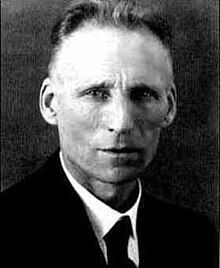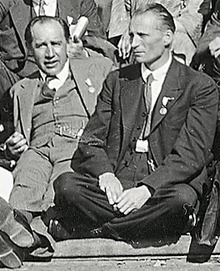L. E. J. Brouwer | |
|---|---|
 | |
| Born | Luitzen Egbertus Jan Brouwer 27 February 1881 Overschie, Netherlands |
| Died | 2 December 1966 (aged 85) Blaricum, Netherlands |
| Nationality | Dutch |
| Alma mater | University of Amsterdam |
| Known for | Brouwer–Hilbert controversy Brouwer fixed-point theorem Brouwer–Heyting–Kolmogorov interpretation Jordan-Brouwer separation theorem Kleene–Brouwer order Phragmen–Brouwer theorem Tietze-Urysohn-Brouwer extension theorem Simplicial approximation theorem Bar induction Degree of a continuous mapping Indecomposability Indecomposable continuum Invariance of domain Spread Proving hairy ball theorem Intuitionism |
| Relatives | Hendrik Albertus Brouwer (brother)[3] |
| Awards | Foreign Member of the Royal Society[1] |
| Scientific career | |
| Fields | Mathematics |
| Institutions | University of Amsterdam |
| Thesis | Over de grondslagen der wiskunde (1907) |
| Doctoral advisor | Diederik Korteweg[2] |
| Doctoral students | Arend Heyting[2] |

Luitzen Egbertus Jan "Bertus" Brouwer[a] (27 February 1881 – 2 December 1966) was a Dutch mathematician and philosopher who worked in topology, set theory, measure theory and complex analysis.[2][4][5] Regarded as one of the greatest mathematicians of the 20th century, he is known as one of the founders of modern topology, particularly for establishing his fixed-point theorem and the topological invariance of dimension.[6][7][8]
Brouwer also became a major figure in the philosophy of intuitionism, a constructivist school of mathematics which argues that math is a cognitive construct rather than a type of objective truth. This position led to the Brouwer–Hilbert controversy, in which Brouwer sparred with his formalist colleague David Hilbert. Brouwer's ideas were subsequently taken up by his student Arend Heyting and Hilbert's former student Hermann Weyl. In addition to his mathematical work, Brouwer also published the short philosophical tract Life, Art, and Mysticism (1905).
- ^ Kreisel, G.; Newman, M. H. A. (1969). "Luitzen Egbertus Jan Brouwer 1881–1966". Biographical Memoirs of Fellows of the Royal Society. 15: 39–68. doi:10.1098/rsbm.1969.0002. hdl:10077/30385.
- ^ a b c L. E. J. Brouwer at the Mathematics Genealogy Project
- ^ van DALEN, Dirk (1978). "Brouwer: The Genesis of his Intuitionism". Dialectica. 32 (3/4): 291–303. ISSN 0012-2017. JSTOR 42970321.
- ^ O'Connor, John J.; Robertson, Edmund F., "L. E. J. Brouwer", MacTutor History of Mathematics Archive, University of St Andrews
- ^ Atten, Mark van. "Luitzen Egbertus Jan Brouwer". In Zalta, Edward N. (ed.). Stanford Encyclopedia of Philosophy.
- ^ Gillies, Donald. (2012) Philosophical Theories of Probability. Routledge. Milton Park. ISBN 9781134672455. p. 53.
- ^ Van Atten, Mark (2016), "Brouwer, L.E.J.", Routledge Encyclopedia of Philosophy
- ^ Luitzen Egbertus Jan Brouwer entry in Stanford Encyclopedia of Philosophy
Cite error: There are <ref group=lower-alpha> tags or {{efn}} templates on this page, but the references will not show without a {{reflist|group=lower-alpha}} template or {{notelist}} template (see the help page).